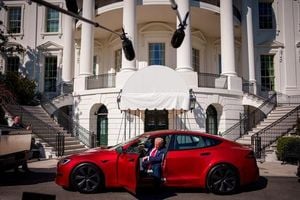Early voting is now underway for El Paso's highly anticipated mayoral and city council runoff elections, set to take place on December 14. The excitement is palpable as voters prepare to cast their ballots concerning not just the future mayor but also for five pivotal city council seats, marking significant moments for many candidates and the community they intend to serve.
Among the key players is businessman Renard Johnson, whose fundraising efforts have surpassed the $1 million mark, amassing $1.08 million since his campaign launch earlier this year. His opponent, city representative Brian Kennedy, has raised considerably less, approximately $64,000, and has often self-funded his campaign to compensate for lower donations.
"It was a conscientious decision to predominantly self-fund," Kennedy remarked, reflecting on his strategy amid the competitive fundraising environment. The stark difference between the two candidates' financial backing highlights the contrasting pathways each is taking to galvanize support for their respective campaigns.
Johnson, 58, credits his campaign's strength to the backing of over 600 community supporters comprising teachers, veterans, business owners, and everyday citizens, all enthused about what he's labeled as his vision for El Paso. He stated proudly, "If elected, I look forward to serving all El Pasoans." His philanthropic touch seems to resonate, especially when he mentions key donations from his father Alvin Johnson and local business supporters like Julio Chiu.
The juxtaposition between Johnson and Kennedy is not just about finances; the political narrative has heated up, with campaign attacks targeting Kennedy by political action committees favoring Johnson. Kennedy has accused Johnson of being under the sway of special interest groups, which Johnson firmly denies, asserting his father remains his primary benefactor.
El Paso's political climate is not new to intense campaigns, and this runoff election is no exception. The current conditions are indicative of the mounting scrutiny candidates face, with Kennedy's camp experiencing its share of physical campaigning fatigue and digital attacks. Meanwhile, early voting results are trickling in, with about 18,000 ballots cast up until now, showcasing the dynamic around this event.
Statistics indicate the early voting phase started on December 2 and is limited to just nine days, as opposed to the usual 12. With nearly 527,000 registered voters expected to participate, recent projections estimate only about 10% might show up at the polls, emphasizing the competition not only between the candidates but also against low voter turnout. Local Election Administrator Lisa Wise mentioned, "Runoff elections bring historically low turnout," which presents unique challenges for both campaigns.
Considering past elections, such as the December 2020 runoff where 24,400 ballots were cast after just one week, the current figures suggest there may be fewer voters engaging this time around. It's uncertain how the reduced early voting period will affect overall turnout, but it’s clear both campaigns must mobilize effectively.
Registered voters across El Paso are eligible to vote for the mayoral candidates, distinguished by their distinct proposals for the future of the city—economic growth, education reforms, and community improvement are at the forefront of discussions. Specifically, those living within Districts 1, 3, 4, 5, and 7 will also cast votes for their city council representatives.
The district-specific races promise their own competitiveness—District 1 pits Alejandra Chavez against Monica Reyes, District 3 showcases Deanna Maldonado-Rocha's challenge against Jose Rodriguez, and more contentious entries exist within Districts 4, 5, and 7 as well, all aiming to reshape the power dynamics within local government.
Candidates vying for these city council seats face the unique responsibility of addressing the immediate needs and concerns of their constituents. The connections forged there can define their political careers and influence their approaches to the bigger issues underlying El Paso’s growth.
Johnson hopes to ride the momentum of his significant funding advantage as he pushes for community-based initiatives, emphasizing cooperation with local stakeholders. Meanwhile, Kennedy's self-funding approach continues to speak to years of personal investment and the challenge of rallying external support. His campaign's endurance speaks to his long tenure with the city, which may not translate as efficiently among younger voters with differing priorities.
The crux of this election may well rest on voter perceptions—whether they lean toward the promise of new leadership with inspiring community involvement or the reliability of seasoned governance backed by personal finances. Interior discussions around wages, employment, and city vision will only intensify as election day rapidly approaches.
The residents of El Paso face distinct choices and significant consequences hinging on the outcome of this runoff, as both Johnson and Kennedy represent more than just themselves—they encapsulate visions and futures for thousands within the community. With the election looming, it’s time for El Pasoans to make their voices heard and influence the direction of their city for years to come.



